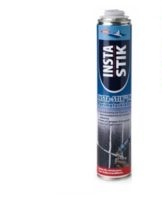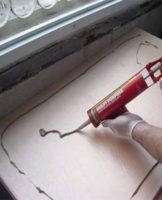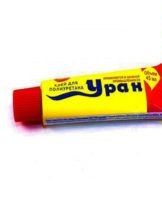Types, features and areas of application of Ceresit tile adhesive, how to breed
Sooner or later people have to deal with repairs in the apartment. It is very important to select high-quality tools and materials for construction work. Especially if during the renovation process it is necessary to glue the tiles in the kitchen or bathroom. Most often they use Cerezit tile adhesive for this.
General characteristics of the Ceresit line
Ceresit glue has the following distinctive characteristics:
- Raincoat. "Ceresit" does not pass moisture, and therefore is used for gluing tiles in the bathroom.
- Frost resistant. Resistance to low temperature indicators allows the use of such glue not only indoors, but also outdoors.
- Possibility of application on deformed coatings. The adhesive does not need to be used on a perfectly smooth surface.
- Sustainability. Since Ceresit is made on the basis of cement, it does not deteriorate for decades.
Types, properties, application
There are nine varieties of "Ceresite", which are used when gluing tiles.
CM 9 - for tiles and tiles
The least popular glue in the Ceresit range. Its main drawback is considered weak protection against temperature extremes and low resistance to moisture. In addition, CM 9 hardens for a long time - within 3-4 days. Experts advise using a compound for gluing facing bricks, decorative stones and tiles.
You can only use CM 9 on flat surfaces, because when gluing on deformed surfaces, the adhesion is weak.
CM 11 Plus - for indoor and outdoor use
If gluing is to be done outdoors, it is best to use CM 11 Plus. This adhesive mixture is used for fixing bricks and tiles. It is also added to cement, concrete and lime mortars.
The distinctive characteristics of CM 11 are its resistance to frost, high temperatures and humidity.
CM 11 has a low level of moisture absorption, which is only 3%. It is thanks to this that the glue can be used for outdoor work. The composition quickly hardens after use - within 30-40 hours.
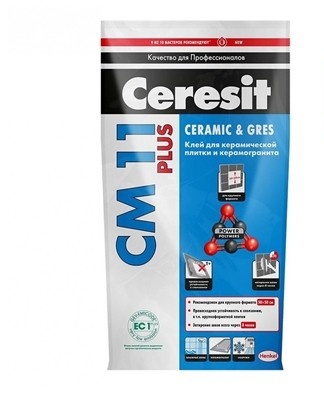
CM 12 - for porcelain stoneware
People who are going to cover the floor with large tiles can use the special CM 12 glue for porcelain stoneware. This glue is used only for indoor work, it is not suitable for outdoor work due to its low frost resistance.
Key features of the adhesive include:
- high plasticity, due to which the mixture has a thick, viscous consistency;
- moisture resistance, which allows the use of CM 12 in rooms with high humidity;
- durability and reliable grip even on uneven surfaces.
CM 14
For working with ceramic surfaces, many experts recommend using the CM 14 adhesive mixture. It is considered universal, as it is suitable for interior and exterior decoration. The characteristics of CM 14 include high temperature tolerance, this which allows the use of glue to cover warm floors.
CM 14 has the following characteristics:
- thick consistency that reliably holds tiles on vertical surfaces;
- not susceptible to the effects of moisture and frost;
- environmental friendliness and safety;
- compatibility with other types of glues in the Ceresit range.
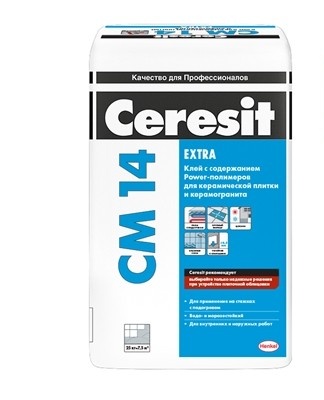
CM 16 - for outdoor and indoor use
CM 16 is ideal for wall cladding with tiles, clinker, porcelain stoneware and decorative stone. The composition is elastic and does not deform under the influence of high or low temperatures. CM 16 is not afraid of water and is therefore used for cladding of balconies, terraces and even swimming pools. To improve adhesion, this glue is used with Ceresit 65 or 51.
CM 17
It is a high elasticity adhesive composition, used for exterior and interior use. Experienced builders advise using CM 17 only for working with deformed coatings. Moreover, it is not only used for gluing tiles. It is also suitable for working with particle board, gypsum, drywall and concrete. Moisture resistance allows CM 17 to be applied on damp surfaces.
The composition hardens 40-50 minutes after application, so a person has enough time to adjust the glued material.
CM 115 - for mosaics
For fixing marble, glass and mosaics it is necessary to use "Ceresit" CM 115.The main advantages of this glue are:
- the possibility of using on the surface of the insulated floor;
- elasticity;
- frost resistance and moisture resistance;
- prevent the development of mold on treated surfaces.
To improve the properties of the glue, it is mixed with elasticizers before use.
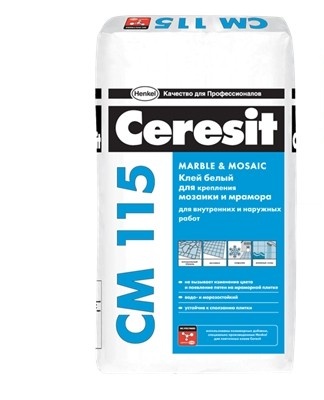
CM 117 - Antifreeze adhesive for facade tiles
For facing the facade with tiles, CM 117 is suitable, which is resistant to frost and high humidity. This mixture can also be used indoors for bonding tiles in the bathroom.
Easy Fix for wet rooms
Experts recommend buying Easy Fix for laying medium-sized ceramic tiles. Adhesive properties allow this product to be applied to both vertical and horizontal surfaces. Easy Fix is not afraid of frost and high temperatures. In addition, the composition is resistant to moisture, which allows you to use it outdoors.
Conditions to consider when choosing an adhesive
When choosing "Ceresita" it is necessary to take into account the conditions under which it will be applied. You should also take into account the characteristics of the material that will need to be glued. Experts advise choosing multi-purpose tools suitable for outdoor and indoor use.
To choose a universal glue, you should carefully read the information on the package in which it is sold. Most often it contains information about the conditions under which the adhesive can be used.
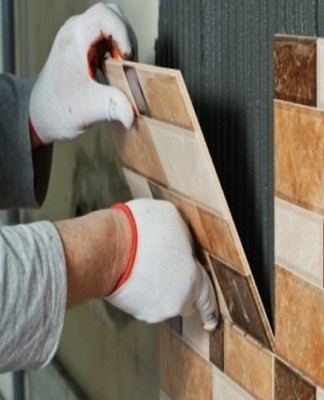
Application Tips
Before using Ceresit, you need to figure out how to dilute the glue mixture.When creating an adhesive solution, it is necessary to mix 2-3 kilograms of dry mixture with 200 milliliters of water. The composition is mixed with a drill until a thick homogeneous mass is obtained.
The mixed solution is infused for 5-10 minutes, after which it is applied to the surface with a notched trowel. The tiles are then carefully glued to a vertical or horizontal surface.
Conclusion
Some people are faced with the need to tile floors or walls with ceramic tiles. For this, it is recommended to use Ceresit glue. Before using tile glue, you need to know the types of glue and their peculiarities.

